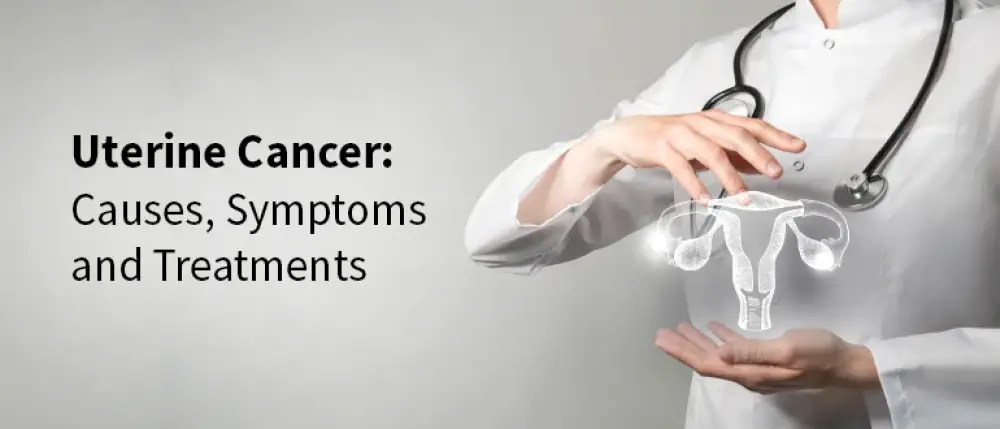Subscribe to get weekly insights
Always stay up to date with our newest articles sent direct to your inbox
Published on 30 Apr, 2024
Updated on 2 May, 2024
5944 Views
4 min Read

Written by Rashmi Rai
favorite0Like
favoriteBe the First to Like
Uterine cancer, also known as endometrial cancer, ranks sixth among the types of cancer that most significantly impacts women globally. In India, while uterine cancer currently accounts for approximately 2.5% of reported cancer cases, its incidence is sharply rising, making it the predominant cancer type affecting women in the country.
Uterine cancer is an uncontrolled DNA mutation in the cells of the uterus. It develops in the inner lining or muscle tissues of the uterus. Through timely diagnosis and treatment, this cancer can be cured. The removal of the uterus is generally the first line of treatment that is given to uterine cancer-affected patients.
If you or someone you know has been struggling with uterus cancer symptoms, this article may help you understand and manage this condition. Let’s go a little deeper to know what is uterine cancer, what are the symptoms of uterine cancer, its causes, and the probable treatments.
Uterine cancer is the most common form of cancer that occurs in the uterus of women due to abnormal cell growth. This is caused by the uncontrolled genetic mutation. Significantly, there are two types of uterine cancer: endometrial cancer and uterine sarcomas. To know about endometrial cancer, you need to know what is endometrium. The endometrium is the inner lining of your uterus.
Endometrial cancer is the most reported form of uterine cancer that occurs in the inner lining of the uterus out of the 3 layers of uterus. Uterine sarcomas (or myometrium cancer) is rarely observed and occurs in the muscle tissue of the uterus. Since endometrial cancer makes up around 95% of uterine cancers, endometrium and uterine cancers are used synonymously.
On-time diagnosis of uterine cancer symptoms may stop its recurrence. If left untreated, the cancerous cells can spread to the rectum, vagina, bladder, fallopian tubes, ovaries, and then to other organs of the body.
Some common uterine cancer causes include:
Watch out for these uterine cancer symptoms to detect the cancerous cell growth at an initial stage:
Generally, surgery is the first-line treatment that is given to remove the uterus tumor so that its further progression to other healthy organs can be restricted. You will get the hysterectomy surgical treatment to cure endometrial cancer. First of all, your doctor will probably prescribe an endometrial biopsy and other diagnostic tests to detect the stage of your cancer.
Based on the stage of endometrial cancer, you may be recommended any one of the hysterectomy surgery:
1. Vaginal Hysterectomy: It is used for the removal of the uterus through the vagina.
2. Total Abdominal Hysterectomy: It removes the uterus through the incision in the abdomen.
3. Radical Hysterectomy: This surgery is performed when cancerous cells reach the cervix. During this process-
4. Minimally Invasive Hysterectomy: During this process, is removed through multiple surgical cuts robotically or through laparoscopy.
The surgical treatment of uterine cancer can be paired with the following non-surgical treatments:
While it's not possible to completely prevent cancer, there are several preventive measures one can follow to reduce the risk:
According to the Indian Council of Medical Research - National Cancer Registry Program (ICMR-NCRP), the number of cancer cases will escalate to 15.7 lakh by 2025. These numbers are alarming. And while prevention may not always be certain, being prepared for such a disease is essential.
You need to keep in mind that cancer treatment requires multiple hospitalisations. It comes with recurrent and hefty medical costs that can burden the patient’s mental health and the family’s financial well-being. Hence, it is vital to invest in a cancer-specific insurance plan. Here is why:
Cancer can take a serious troll on one’s health as well as finances. The repercussions can be huge that may put the entire family in a serious financial strain. Though your regular health insurance comes in handy in covering multiple health emergencies, the coverage offered may not be sufficient incase of treating cancer.
In such a scenario, a cancer-specific insurance plan comes with extensive coverage that offers easy-claim settlement for surgical intervention, chemotherapy, radiation, medications, and other treatment costs. Opting for Cancer Insurance Plan offered by Care Health Insurance is a proactive approach to safeguarding the entire family’s health, happiness, and prosperity. The policy offers extensive coverage up to INR 1 crores along with multiple amazing benefits including NCB bonus up to 100%, annual health check-ups, global coverage and OPD coverage, air ambulance etc. To be familiar with the policy terms and conditions, kindly connect with our experts or visit the website.
We wish you good health!
>> Also Read: Cervical Cancer Symptoms, Diagnosis and Treatment
Disclaimers: The above information is for reference purposes only. Kindly consult your general physician for verified medical advice. The health insurance benefits are subject to policy terms and conditions. Refer to your policy documents for more information.
favoriteBe the First to Like
शुगर कंट्रोल कैसे करे? जानें, डायबिटीज में क्या खाना चाहिए Care Health Insurance in Health & Wellness
Thyroid : मामूली नहीं हैं महिलाओं में थायराइड होना, जानें इसके लक्षण और घरेलू उपचार Care Health Insurance in Diseases
हाई ब्लड प्रेशर को तुरंत कंट्रोल कैसे करें? देखें इसके उपाय Care Health Insurance in Diseases
प्लेटलेट्स की कमी के लक्षण, कारण और इलाज क्या है Care Health Insurance in Diseases
Decoding Oral Cancer: Symptoms, Risk Factors, Diagnosis & Treatment Care Health Insurance in Diseases
Why is the Rate of Cancer So High in Kerala? Care Health Insurance in Diseases
What is Thyroid Cancer? Its Symptoms, Types & Treatment Care Health Insurance in Diseases
Everything About Irritable Bowel Syndrome: Causes, Symptoms & Treatment Care Health Insurance in Diseases